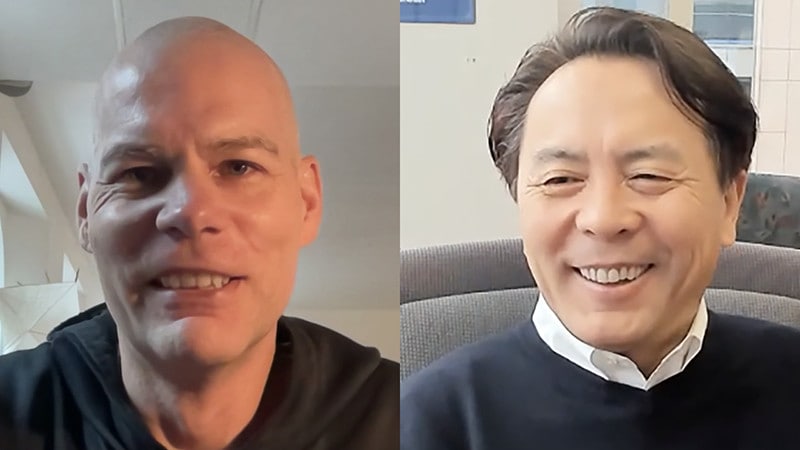CAR T Cells and Immunotherapy in Mantle Cell Lymphoma: Insights from Dr. Michael Wang
Core Concepts
CAR T-cell therapies show promising results in mantle cell lymphoma treatment.
Abstract
Introduction to Dr. Peter Martin and Dr. Michael Wang.
Dr. Wang's journey and motivation in the field of mantle cell lymphoma.
Discussion on CAR T cells and immunotherapy in mantle cell lymphoma.
Comparison of ZUMA-2 trial with other therapies.
Real-world data confirming ZUMA-2 trial results.
Impact of prior BTK inhibitor therapy on CAR T-cell efficacy.
Importance of bridging therapy and tumor bulk control.
Influence of bendamustine on CAR T-cell expansion.
Management strategies for patients receiving CAR T cells.
Addressing neurotoxicity and cytokine release syndrome.
Potential role of bispecific antibodies in mantle cell lymphoma treatment.
Gratitude for Dr. Wang's contributions to clinical trials in mantle cell lymphoma.
Episode 4: CAR T Cells and Immunotherapy in Mantle Cell Lymphoma
Stats
"In the original data published in The New England Journal of Medicine, the overall response rate was 93% and the complete response (CR) was 67%."
"After two more years of follow-up, we reported at the American Society of Clinical Oncology last year in 2022 at 3 years of follow up that the overall response rate was 91%."
"The response rate was 83%, the CR was 73%, and the CRS was 15% at grade 3 or 4."
Quotes
"Life is like this — eventually you find your niche, and you will not let it go because it is the best way to contribute, pay back society, and pay back what people invest into you." - Dr. Michael Wang
"I would be very careful giving the patient CAR T cells. I usually have a family conference to tell them the risks and what will happen — 20% of patients go to ICU, 3% or 4% or 5% get intubation, and 2% of people don't survive." - Dr. Michael Wang
Key Insights Distilled From
by Peter Martin at www.medscape.com 03-30-2023
https://www.medscape.com/viewarticle/982891
Deeper Inquiries
How can the potential exhaustion of T cells from repeated immunotherapies impact long-term patient outcomes?
The potential exhaustion of T cells from repeated immunotherapies can have significant implications for long-term patient outcomes. T cells play a crucial role in the immune response, and their exhaustion can lead to decreased efficacy of immunotherapies and increased susceptibility to infections. When T cells are repeatedly activated or targeted by therapies like CAR T cells or bispecific antibodies, they may become functionally exhausted, losing their ability to effectively target and eliminate cancer cells. This exhaustion can result in shorter response durations, lower response rates, and potentially compromised overall survival for patients. Additionally, exhausted T cells may not be able to mount robust immune responses against new threats, leaving patients vulnerable to infections and other complications. Therefore, managing T cell exhaustion and finding strategies to preserve T cell function are essential for optimizing the long-term outcomes of patients undergoing immunotherapy for mantle cell lymphoma.
What are the implications of using bendamustine as bridging therapy in patients receiving CAR T cells?
The use of bendamustine as bridging therapy in patients receiving CAR T cells can have important implications for treatment outcomes. Bendamustine is a chemotherapy agent that can impact the immune system and potentially affect the efficacy of subsequent immunotherapies like CAR T cells. Studies have shown that patients who receive bendamustine within 6 months of CAR T cell therapy may have poorer CAR T cell expansion and outcomes. This suggests that recent exposure to bendamustine could negatively impact the effectiveness of CAR T cell treatment. Therefore, when considering bendamustine as bridging therapy, it is crucial to carefully assess the timing of its administration to minimize any potential negative effects on CAR T cell therapy. Additionally, alternative bridging therapies that do not interfere with T cell function or expansion may be preferred to optimize the success of CAR T cell treatment in mantle cell lymphoma patients.
How might the development of bispecific antibodies change the landscape of mantle cell lymphoma treatment in the future?
The development of bispecific antibodies holds great promise for changing the landscape of mantle cell lymphoma treatment in the future. Bispecific antibodies are designed to target both cancer cells and immune cells, enhancing the immune system's ability to recognize and eliminate cancer cells. In the context of mantle cell lymphoma, bispecific antibodies like glofitamab have shown impressive response rates and efficacy in clinical trials. These antibodies offer a targeted and potentially less toxic alternative to traditional chemotherapy or CAR T cell therapy. By engaging the immune system to specifically target cancer cells, bispecific antibodies can provide a more tailored and precise treatment approach for mantle cell lymphoma patients. Additionally, the convenience of antibody-based therapies compared to complex CAR T cell procedures may make them more accessible and widely applicable in clinical practice. As more bispecific antibodies are developed and tested, they have the potential to become a cornerstone of mantle cell lymphoma treatment, offering new options for patients and improving overall outcomes in the field of immunotherapy.
0
